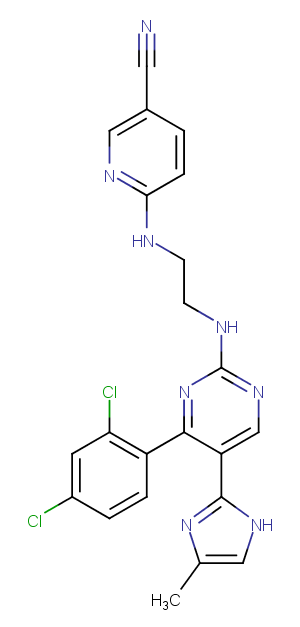CHIR-99021
| Code | Size | Price |
|---|
| TAR-T2310-2mg | 2mg | £103.00 | |||||||||||||||||||||||||||||||||||||||||||||||||||||||||||||||||||||||||||||||||||||||||||||||||
| Special offer! Add £1 to your order to get a TargetMol CCK-8 Kit. Read more here. | |||||||||||||||||||||||||||||||||||||||||||||||||||||||||||||||||||||||||||||||||||||||||||||||||||
Quantity:
| TAR-T2310-5mg | 5mg | £119.00 | |||||||||||||||||||||||||||||||||||||||||||||||||||||||||||||||||||||||||||||||||||||||||||||||||
| Special offer! Add £1 to your order to get a TargetMol CCK-8 Kit. Read more here. | |||||||||||||||||||||||||||||||||||||||||||||||||||||||||||||||||||||||||||||||||||||||||||||||||||
Quantity:
| TAR-T2310-1mL | 1 mL * 10 mM (in DMSO) | £123.00 | |||||||||||||||||||||||||||||||||||||||||||||||||||||||||||||||||||||||||||||||||||||||||||||||||
| Special offer! Add £1 to your order to get a TargetMol CCK-8 Kit. Read more here. | |||||||||||||||||||||||||||||||||||||||||||||||||||||||||||||||||||||||||||||||||||||||||||||||||||
Quantity:
| TAR-T2310-10mg | 10mg | £142.00 | |||||||||||||||||||||||||||||||||||||||||||||||||||||||||||||||||||||||||||||||||||||||||||||||||
| Special offer! Add £1 to your order to get a TargetMol CCK-8 Kit. Read more here. | |||||||||||||||||||||||||||||||||||||||||||||||||||||||||||||||||||||||||||||||||||||||||||||||||||
Quantity:
| TAR-T2310-25mg | 25mg | £209.00 | |||||||||||||||||||||||||||||||||||||||||||||||||||||||||||||||||||||||||||||||||||||||||||||||||
| Special offer! Add £1 to your order to get a TargetMol CCK-8 Kit. Read more here. | |||||||||||||||||||||||||||||||||||||||||||||||||||||||||||||||||||||||||||||||||||||||||||||||||||
Quantity:
| TAR-T2310-50mg | 50mg | £287.00 | |||||||||||||||||||||||||||||||||||||||||||||||||||||||||||||||||||||||||||||||||||||||||||||||||
| Special offer! Add £1 to your order to get a TargetMol CCK-8 Kit. Read more here. | |||||||||||||||||||||||||||||||||||||||||||||||||||||||||||||||||||||||||||||||||||||||||||||||||||
Quantity:
| TAR-T2310-100mg | 100mg | £415.00 | |||||||||||||||||||||||||||||||||||||||||||||||||||||||||||||||||||||||||||||||||||||||||||||||||
| Special offer! Add £1 to your order to get a TargetMol CCK-8 Kit. Read more here. | |||||||||||||||||||||||||||||||||||||||||||||||||||||||||||||||||||||||||||||||||||||||||||||||||||
Quantity:
Prices exclude any Taxes / VAT
Overview
Regulatory Status: RUO
Shipping:
cool pack
Storage:
-20℃
Images
Documents
Further Information
Bioactivity:
CHIR-99021 is a GSK-3α/β inhibitor (IC50: 10/6.7 nM).
Biological Applications:
CHIR-99021 is a highly selective inhibitor of GSK-3α/β, which are regulators of the Wnt signaling pathway. By inhibiting GSK-3α/β, CHIR-99021 promotes the activation of the Wnt signaling pathway, thereby influencing the self-renewal and differentiation of stem cells. For example, human pluripotent stem cell (hPSC)-derived organoids such as Heart Forming Organoids (HFOs) represent a complex, highly structured in vitro model of early heart, gut, and vascular system development. These organoids are commonly used in teratogenic research, gene function analysis, and drug discovery studies. CHIR-99021 and IWP2 (Catalog No. T2702) are typically used during the establishment of this model for cell differentiation.
As research progresses, scientists have found that CHIR-99021 significantly enhances the quantity and functionality of stem cells, showing promising applications across various stem cell types. The scope of CHIR-99021's applications continues to expand. Apart from its use in the field of stem cells, CHIR-99021 also demonstrates potential therapeutic value in neurodegenerative diseases, tumors, and metabolic disorders. In neurodegenerative diseases, CHIR-99021 can inhibit the generation and aggregation of beta-amyloid proteins, thereby slowing the progression of conditions like Alzheimer's disease. In the field of tumors, CHIR-99021 can modulate tumor cell proliferation and apoptosis, inhibiting tumor growth and metastasis. Additionally, CHIR-99021 can improve symptoms of metabolic disorders such as diabetes and obesity, promoting metabolic balance in the body.
CAS:
252917-06-9
Formula:
C22H18Cl2N8
Long Description:
CHIR-99021, also known as Laduviglusib or CT99021, is a highly selective inhibitor of GSK-3α/β (Glycogen synthase kinase 3), with IC50 values of 10 nM and 6.7 nM, respectively. It is also an effective activator of the Wnt/β-catenin signaling pathway. Additionally, CHIR-99021 can induce autophagy and enhance self-renewal in mouse and human embryonic stem cells.
Molecular Weight:
465.34
Pathway:
Autophagy; Cytoskeletal Signaling; PI3K/Akt/mTOR signaling; Stem Cells
Purity:
0.9891
Research Area:
type 2 diabetes, Alzheimer's disease, inflammation, cancer, addiction, and bipolar disorder.
SMILES:
Cc1c[nH]c(n1)-c1cnc(NCCNc2ccc(cn2)C#N)nc1-c1ccc(Cl)cc1Cl
Target:
GSK-3; Wnt/beta-catenin; Autophagy
References
1. Ring DB, et al. Selective glycogen synthase kinase 3 inhibitors potentiate insulin activation of glucose transport and utilization in vitro and in vivo. Diabetes. 2003 Mar;52(3):588-95.
2. Li W, et al. Generation of human-induced pluripotent stem cells in the absence of exogenous Sox2. Stem Cells. 2009 Dec;27(12):2992-3000.
3. Naujok O, et al. Cytotoxicity and activation of the Wnt/beta-catenin pathway in mouse embryonic stem cells treated with four GSK3 inhibitors. BMC Res Notes. 2014 Apr 29;7:273.
4. Bennett CN, et al. Regulation of Wnt signaling during adipogenesis. J Biol Chem. 2002 Aug 23;277(34):30998-1004.
5. Wei-jian L I, Zhen-yu W, Tian-jie Y, et al. The study of immortalized hepatocyte-derived liver progenitor-like cells used in bioartificial liver therapy[J]. Chinese Hepatolgy. 24(8): 871.
6. Gong-Bo Fu, Wei-Jian Huang, Min Zeng, Xu Zhou, Hong-Ping Wu, Chang-Cheng Liu, Han Wu, Jun Weng, Hong-Dan Zhang, Yong-Chao Cai, Charles Ashton, Min Ding, Dan Tang, Bao-Hua Zhang, Yi Gao, Wei-Feng Yu, Bo Zhai, Zhi-Ying He, Hong-Yang Wang, and He-Xin Yan . Expansion and differentiation of human hepatocyte-derived liver progenitor-like cells and their use for the study of hepatotropic pathogens [J]. Cell Research. 2019 Jan;29(1):8-22.



